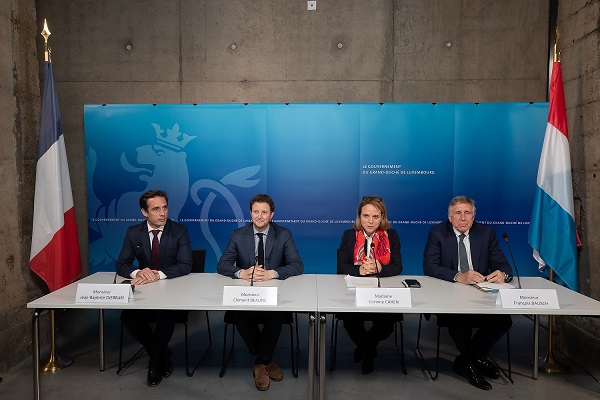 L-R: Jean-Baptiste Djebbari (France); Clément Beaune (France); Corinne Cahen (Luxembourg; François Bausch (Luxembourg;
Credit: © SIP / Claude Piscitelli
L-R: Jean-Baptiste Djebbari (France); Clément Beaune (France); Corinne Cahen (Luxembourg; François Bausch (Luxembourg;
Credit: © SIP / Claude Piscitelli
On Tuesday 19 October 2021, the Franco-Luxembourg intergovernmental commission for the strengthening of cross-border cooperation held its sixth meeting in Esch-Belval.
Luxembourg's delegation was chaired by Corinne Cahen, Minister for the Greater Region, whilst Clément Beaune, Secretary of State for European Affairs, chaired the French delegation.
In the context of a constant increase in the number of cross-border workers residing in France and working in Luxembourg (more than 110,000 in the first quarter of 2021), the two parties reaffirmed their attachment to this intergovernmental framework to ensure the proper coordination of public policies and define common initiatives intended to improve the daily lives of cross-border residents and to promote the harmonious co-development of this common space.
The COVID-19 pandemic has brought the two partners closer together, both in terms of the continuity of cross-border flows and cooperation in health and civil security. France and Luxembourg signed cross-border cooperation agreements in the field of health and on urgent medical aid. A local implementation protocol between the Grand Ducal Fire and Rescue Corps (Corps grand-ducal d'incendie et de secours - CGDIS) and the Regional Health Agency (Agence régionale de santé - ARS) will be signed before the end of the year.
During the health crisis, the two countries also concluded tax and social security agreements to facilitate teleworking. This has become an integral part of the daily life of cross-border workers and has had positive implications in terms of reducing travel and carbon emissions. In this context, the intergovernmental commission welcomed the willingness of the two governments to commit to increasing the tax tolerance threshold from 29 to 34 days.
Moreover, the commission emphasised the importance of collective and sustainable transport for cross-border workers. Following its financial commitment of €120 million in 2018, Luxembourg undertook to contribute an additional amount of €110 million for the following rail operations:
- the construction of a maintenance centre in Metz and its connection to the network, with a Luxembourg contribution set at €50 million;
- the automation or semi-automation of train driving and the associated communication system to improve robustness and / or capacity, provided that feasibility studies confirm interest. If this is the case, the parties agree to meet when the time comes to document the strategy for deploying and financing this technology;
- the continuation of work on rail projects financed under the 2018 memorandum of understanding.
In addition, several new projects are emerging, such as:
- the commissioning of the P&R at Thionville-Metzange in spring 2021 and the reorganisation of the bus service, work in progress at the P&R of Longwy and continuation of studies concerning the P&R at Thionville station;
- an analysis in progress to partially extend free bus transport operated by Luxembourg up to 5 km beyond its border;
- the establishment of a working group with a view to setting up a cross-border bus corridor with a high level of service which will link Esch-sur-Alzette (LU) with Audun-le-Tiche (FR);
- the establishment of cross-border cycle paths.
Luxembourg also confirmed its willingness to continue funding cross-border bus services operated by the Grand Duchy, which currently amounts to around €14 million per year.
The two parties praised the dynamism of their cooperation in training, where many projects are under development, including:
- the reform of training courses preparing for health professions in Luxembourg to meet the growing demand for health professionals;
- the strengthening of the training offer for nursing assistants by Luxembourg;
- the signature of an agreement on the promotion of plurilingualism, concerning in particular the organisation of Luxembourgish language and culture courses in Lorraine by Luxembourgish teachers and the establishment of an online learning offer for Luxembourgish;
- the strengthening of interuniversity and hospital-university cooperation in the fields of medicine and health care, through an extension of the additional protocol relating to scientific and university cooperation signed in 2018;
- Luxembourg's commitment to financing the costs of clinical training for medical students from the third year of the Bachelor of Medicine at the University of Luxembourg;
- the development of a skills hub for training in digital technology and new technologies in Longwy.
The two parties welcomed the signing of the Esch2022 - European Capital of Culture framework partnership agreement, which brings together the Luxembourg Pro-Sud municipalities and the Communauté de Communes du Pays Haut-Val d'Alzette (CCPHVA).
The intergovernmental commission also underlined the quality of their cooperation in the area of internal security, with the signing of several texts, including an agreement on cross-border radiocommunication means with Belgium and a joint declaration of intent between the Grand Duchy and the French Republic concerning the creation of a working group on police and customs cooperation under the aegis of the commission. The two parties are continuing their regular exchanges on energy and safety matters.
Finally, both parties recognised the importance of cross-border issues by agreeing to carry out precise and regular monitoring of the implementation of the conclusions adopted by this sixth commission meeting, and to convene the next such meeting in France in 2022.








